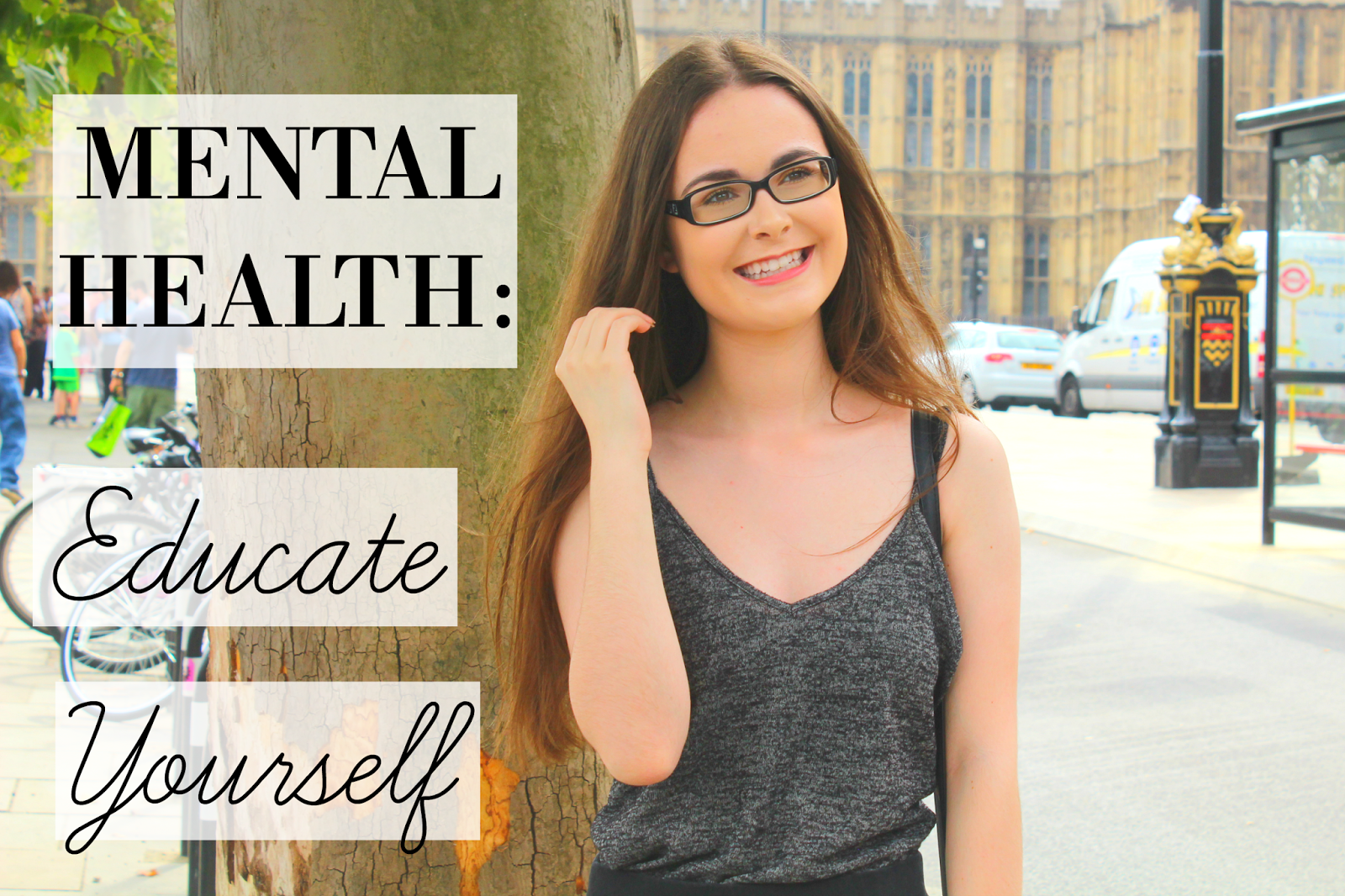MENTAL HEALTH: Educate Yourself
Mental health issues are so prevalent in today's world. Of course, mental illnesses have always been a thing and people have always suffered with them; however, we generally are just more aware of people's suffering now, thanks to the media and technological and scientific advances. We are more aware of the illnesses out there, there is more help available and the whole topic of mental health isn't as taboo as it once was. However, despite how far we've come, despite all of these developments, we still have far to go.
As a society as a whole, we are very ignorant. I'm not saying I'm ignorant nor am I calling you ignorant but the only way we can combat big issues is by uniting and realising that this is ALL of our problem. If we start singling people out, we just create more divisions in society, more hierarchies, more marginalised communities, and that is not what we need, especially at the time we are in right now. We need peace, love and togetherness and we can only overcome the world's problems if we do it as one.
There is no denying that we are an ignorant world. Sure, we know that there are people starving in third world countries but we could do more to help, just in the way that we know mental illnesses are a thing yet we don't make much of an effort to educate ourselves on them, when we should.
Millions of people wake up each morning and go out to face the world with a metaphorical dark cloud over their heads and a weight on their shoulders. Millions of people carry out one of the highest forms of bravery 24/7 by fighting a battle inside their own head which is invisible to all around them. That's why it can be so difficult to help people with mental illnesses, they're invisible. Only the people who occupy them know exactly what it's like to have them, only they know what they are going through and only they know how hard it is for them to explain the pain they are enduring. This makes it tough too because, if only the person with a mental illness knows what kind of help they need, how can someone without said mental illness help them, especially if the person with the illness finds it a difficult topic to speak about? It can often lead to people thinking they are helping but, actually, they're making things worse. For example, you may think that repeating to someone over and over whilst they're having a panic attack "Just breathe," is helping but it’s probably doing the opposite. So, the only way we can know how to help people who are suffering with mental illnesses is to educate ourselves on them.
Mental illness is such a personal thing. Millions of people have the same type of illness but they will all suffer in a different way. Like I said, it's inside your own head and everyone's mind works in a different way, therefore, it would be impossible to write a rule book on how to help people deal with their mental illnesses that works universally. Different people want different things. However, we can educate ourselves on the basics and then, when we know the person in more depth and when we are closer to them, we can understand their individual wants and needs. But, we have to start somewhere and SURELY doing something is better than doing nothing? You're never going to know everything there is to know about every mental illness - no one is expecting you to. However, what you can do is start educating yourself on the world of mental illness and teach yourself a few things you didn't know before. If we all had a little more knowledge on mental illnesses than we currently do, we could save lives. Knowing a little is better than knowing nothing.
It is incredibly rude, I think, to walk around each day knowing nothing or not caring to know anything, about the world of mental illness, especially when there are SO many people around you experiencing them and especially when there is a chance of you suffering with your mental health at some point in your life too. That's the thing, though; people don't really care to know unless it happens to them. People don't read up on illnesses until they have them themselves, which is wrong. We should all be making an effort to learn more about mental illnesses in a bid to create a more accepting, positive and caring society. Plus, I can guarantee that, if everyone knew a bit more about mental illnesses, the stigma around them would be removed. People judge those with mental illnesses because they do not understand them nor can they empathise with them. The truth is, you do not need to have a mental illness yourself to be able to understand those who do. DO NOT have that "I don't have a mental illness so it isn’t my problem" attitude. It is downright rude. We need to work together to help dispel damaging myths and misconceptions surrounding all mental illnesses if we want to create a better world for future generations and if we want to save lives that are lost unnecessarily in their thousands each week.
"But what can I do?" You may ask. Well, if you're reading this right now, that means you have access to the internet. You probably carry your smart phone around with you most of the time; meaning Google (or another search engine of your choice) is right at your fingertips. It takes seconds to type in the name of a mental illness and read up on its symptoms, possible treatments and what it entails. The NHS website, for example, is available to everyone and it gives in depth information on any illness you may or may not be able to think of. There is information out there, readily available to you, you just have to look for it. I understand that we all live busy lives these days and it can be difficult to find a spare second to breathe but all it takes is a few taps of a keyboard and you could potentially learn something which will save a life. How many times a day do you scroll through Twitter? Facebook? Instagram? Probably more than necessary and its probably out of habit and boredom, so, use those times of boredom to educate yourself on what is going on around you.
Whilst we are on the topic of social media, there are thousands of pages out there dedicated to mental health issues. There are normal everyday people like you and I suffering with mental illnesses, there are charities, organisations, special groups, there are people who know things which you do not so reach out to them. Do not feel ashamed to drop them a Tweet, a message or a comment to ask them a question. I can assure you that they will not think it rude, if anything, they will be pleased to see someone attempting to educate themselves. Once again, this takes seconds and social media’s power grows and grows every day, therefore, we should use it for good and utilise how influential it can be. Once you find something out, Tweet about it, share it, post about it, spread the word about mental illnesses and inform the world of these new facts you have just discovered.
Also, in terms of asking people questions, it is something, generally, we are rather terrible at. We’re often ashamed to ask questions unless we already know the answer as we worry that people will think of us as stupid, dumb, pathetic. We need to get ourselves out of that mind-set. Asking questions is healthy. It generates discussions and it teaches people new things. Everyone around you is a fountain of knowledge in their own way and so everyone can tell you something which you didn’t know before. Just make it your mission to learn something new every day, read books, use the internet and pester people until they answer your questions. Being inquisitive about mental health problems isn’t rude, what’s rude is refusing to open your eyes to the world of mental health when there really is no excuse, not in today’s world.
It may seem like nothing, picking up a dictionary to look up the definition of an illness or scrolling through Google, reading up on a particular illness but that simple task has the potential to save lives. If we are more educated on how to help those around us who are suffering, we will know what to look out for and we shall be able to recognise problems before it’s too late. Just because you are not suffering, doesn’t mean nobody else is. And you may not think that you need to know anything about mental illnesses but just try putting yourself in the shoes of someone who has one. It can mean the world to them to meet someone who just GETS IT. Sometimes, all it takes to put a smile on their face is for someone to be kind to them, not talk to them in a condescending way and for someone to treat them like a normal human being as oppose to being awkward around them because they aren’t sure what they should say. If you care about people, if you care about the state of our world then I urge you to do something about your mental health knowledge. Expand the little bubble that you live in, realise that there are more mental illnesses other than anxiety, depression and OCD, there is a big world out there waiting for you to explore it, so do just that, if not for your own sake, but for others.



Thank you for sharing such great information. It has help me in finding out more detail about Overseas Study Loan
ReplyDelete